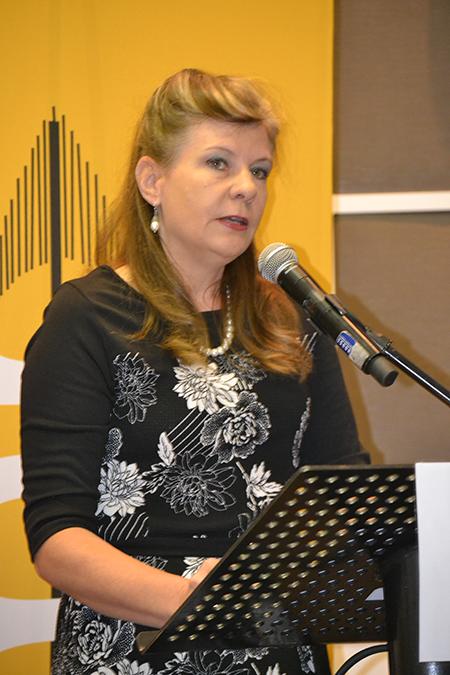Prof Du Plessis gave the audience, comprising members of the private and public sectors of the Sedibeng business community, insight into the lessons that the campus learned from the #FeesMustFall movement.
The movement – characterised by protest action that rocked the higher education sector in 2016 and in some cases brought it to a halt – was hardly unique to South Africa. Similar actions also took place across the globe in the last couple of years: London in 2010; Peru in 2013 and Germany in 2014.

Prof Linda du Plessis
Communication is important
Prof Du Plessis said that – in the case of the NWU’s campus in Vanderbijlpark – communication with various stakeholders was of utmost importance and that communication channels had to be altered to be optimally utilised. Even though it was important to ensure that the public received the correct message, there was also a lot of emotional uncertainty among staff and students about what exactly was happening.
Prof Du Plessis is of the opinion that the importance of pro-active communication in situations such as these cannot be over emphasised, especially in the age of social media. “Communication is a two-way process and we had to truly listen. We had to listen to what was said, but also listen to that which was not said. At that point in time, it was critical that management addressed deeper issues with an open mind.”
Take action
The time came for critical decisions to be made. The closing of the campus would have many negative consequences, among others the loss of valuable academic time and the lack of access to computers and study material (library facilities). At that stage 16 campuses nationwide had been closed already, and according to police, the national agenda of the movement was to close down as many institutions as possible. The safety of staff and the 2 000 students who stayed in residences on campus was also on the line and in the end it was decided to close the campus.
Another lesson to be learned was for management to be open to the expertise of others. “Without teamwork there would have been no way out of such a dilemma,” shared Prof Du Plessis. The situation in which the university found itself also created the opportunity to discover other, new ways to teach. The millennium generation was studied closely and student leaders were involved in the process of identifying sustainable solutions. “We saw that a university is an important part of the community, just like any other business, and also has a role to play to bring positive change about. Sometimes it takes a crisis such as this one or a burning platform to bring change and transformation about,” she said.
Despite all these challenges, the university still managed to successfully complete the final exams of 2016, to maintain an 84% pass rate and to deliver 15 597 graduates.
“The #FeesmustFall movement taught us that we can change the world if we change our immediate surroundings,” concluded Prof Du Plessis, challenging the audience to take hands and make a positive impact in the world.
*The NWU’s campus in Vanderbijlpark also walked away with a Diamond Arrow PMR Award in the category for Higher Education and Tertiary Institutions in the Sedibeng District.
